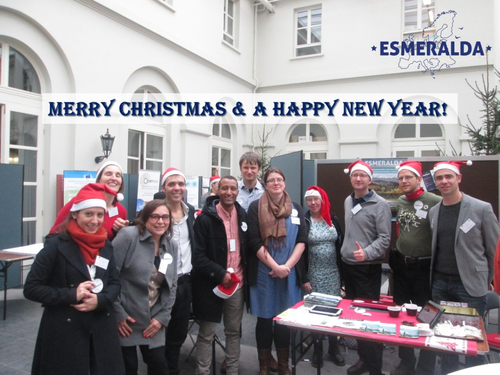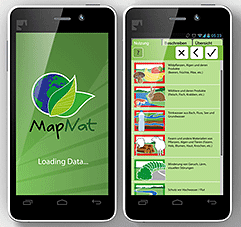News
Twi PhD positions for ecosystem services in coastal regions have been opened at Kiel University. Click on the links below to download the official offers and learn how to apply.
Project BACOSA II:
1 position for Ecological Assessment
1 position for Economic Assesment.
Application deadline: March 31, 2016.
The University of Southampton is seeking to appoint two Research Fellows to work with Dr Felix Eigenbrod on his European Research Council Starting Grant, "Scaling Rules for Ecosystem Service Mapping (SCALEFORES)" in the School of Geography and the Environment. Qualified applicants are encouraged to apply for both positions.
Position 1: Applied Biogeography. Apply at: https://jobs.soton.ac.uk/Vacan
Position 2: Spatial Modelling. Apply at:https://jobs.soton.ac.uk/Vacan
The deadline for application for both positions is 1 April 2016.
The Climate Action and Resource Efficiency Directorate of DG Research and Innovation organised on 29 February 2016 in Brussels a science – science interface workshop with an emphasis on biodiversity and ecosystem services related themes. The objective of the meeting was to identify synergies between EU funded research and networking projects and actions; foster collaboration on scientific and technical issues, as well as communication and science-policy strategies.
Projects funded under various funding schemes such as FP7, Horizon 2020, Biodiversa, LIFE+, and COST were invited to the meeting. Joachim Maes represented ESMERALDA at the meeting.
The discussions were organised in working groups along five themes: • basic research • applied research • technological developments • prototypes • demonstration projects.
The working groups identified needs and areas for collaboration within and between these themes, discussed bottlenecks and barriers, and proposed possible solutions.Solutions to enhance collaboration between all the different projects include: • More flexibility in the funding schemes to respond better to emerging calls, • Separate funding mechanisms for post project meetings and for workshops and • Open data and publishing.
The European Commission will make a report of the meeting available.
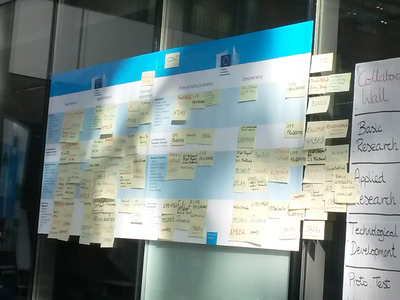
Biodiversity decline is a fact, but how can society be convinced of the benefits of biodiversity for human well being and of the necessity of further protective action? The FP7 funded EU project Biodiversity and Ecosystem Services: Arguments for our Future Environment (BESAFE) addressed this challenge to produce guidance that can help improve the way we use arguments for conservation and convincingly demonstrate the value of biodiversity to decision-makers.

Credit: Rob Bugter
Two key outputs of the project are the final brochure "How to Argue for Biodiversity Conservation More Effectively: Recommendations from the BESAFE project", including key conclusions from project publications and case studies, and an interactive online tool, which can lead stakeholders to the relevant information in a few mouse clicks.
Key recommendations of BESAFE featured in these resources are:
- The success of a more integrated approach depends on stakeholder engagement. A top-down policy framework that sets goals for the protection of particular sites and species is important, but it is not enough to prevent biodiversity loss. - -- An integrated approach, seeking to 'mainstream' biodiversity concerns across all policy sectors (e.g. agriculture, forestry, water, energy, transport and urban planning) is needed.
- Promote bottom-up initiatives at the local level. All stakeholders need to be actively involved in the decision-making process, which should facilitate building trust and working towards generally agreed and accepted solutions.
- Tailor arguments to the audience. Arguments need to be framed to fit the values and goals of the audience, embracing the plurality of values attached to nature, and using appropriate language. For example, over-emphasising economic arguments could alienate people who are motivated mainly by ethical and moral concerns.
- Use positive arguments. Positive framing of arguments to emphasise benefits is often more powerful than negative framing that focuses on threats and losses. The concept of ecosystem services is useful for emphasising positive benefits, provided that it is properly explained to stakeholders.
- Use a wider range of arguments. Arguments based on the economic value of nature for humans dominate European and national policy-making, and are often seen as central to gaining high-level policy-maker support, but our results show that many decision-makers and other stakeholders also use and respond positively to ethical and moral arguments.
"We aimed to provide the essence of 4 years worth of research in an easy to read and reuse form, to maximise the potential of using the right arguments for conservation at the right time in order to successfully demonstrate the value of biodiversity to decision-makers," comments Rob Bugter, co-ordinator of the BESAFE project.
Try out the resources below:
Bugter R., Smith A.C. and the BESAFE consortium. 2015. How to argue for biodiversity conservation more effectively. Recommendations from the BESAFE project. Pensoft Publishers, Sofia, 26 pp. Available at: http://www.
BESAFE web tool available at: http://tool.
From 25 to 26 February 2016, around 20 experts from 10 different European countries met at the European Environment Agency (EEA) in Copenhagen, Denmark. The workshop is part of ESMERALDA (Milestone 19) and was organised by Marion Potschin and Roy Haines-Young from the ESMERALDA partner University of Nottingham (UNOTT, leader of Work Package 4 on Ecosystems Service Assessment Methods) and hosted by the European Environment Agency.
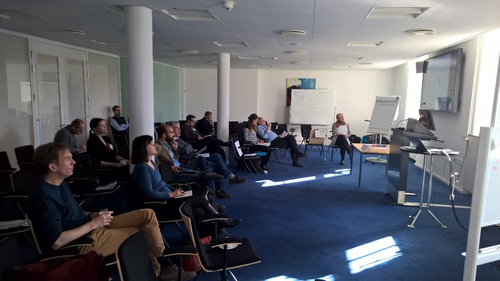
Picture: Workshop participants following a video presentation; Credit: B. Burkhard
The aim of the workshop was to take stock of the experience gained in using the Common International Classification of Ecosystem Services (CICES) Version 4.3 for mapping and assessment, and to advise on the objectives for any future revision and the development of guidelines to help people apply it effectively. The workshop has drawn on interim results from the current consultation on CICES that will be completed in April 2016 (see www.cices.eu).
The outcomes of the meeting will be published as a project Milestone report, helping to define options that can be developed in the CICES revision process and how changes can help meet current user needs. The results will support the development of the ESMERADLA guidelines for a flexible, integrated ecosystem service assessment methodology. Outcomes from the workshop and further insights from the consultation will also be presented during the ESMERALDA workshop II in Nottingham in late April and will form the basis for M20 "CICES-consistent library of indicators for biophysical, social and economic ES dimensions".

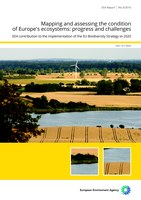 We depend on healthy and resilient ecosystems to continue to deliver services, such as food, water, clean air and stable climate, which are essential for our well-being. A new EEA report provides an overview about the current condition of ecosystems in Europe and the human pressures they are exposed to.
We depend on healthy and resilient ecosystems to continue to deliver services, such as food, water, clean air and stable climate, which are essential for our well-being. A new EEA report provides an overview about the current condition of ecosystems in Europe and the human pressures they are exposed to.
An ecosystem map for Europe reveals that many ecosystems are highly concentrated in a small number of countries, which could increase their vulnerability to environmental change, and a substantial proportion of the most vulnerable ecosystems are not protected within Natura 2000 sites, Marine Protected Areas or equivalent zones.
Download the report on the EEA dedicated page.
Go ahead and test an advanced beta version of MapNat, the ecosystem service (ES) mapping smartphone App.
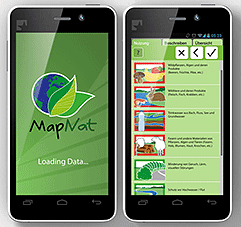 MapNat lets you map the ecosystem services you are actually using in the very moment of mapping. So the mapping perspective is that of ES use or ES ‘flow’. It is designed as a citizen science tool, to be used to get to know more about how people appreciate and use different ES. Just map which ES you are using. On the map display you can also assess which ES have been used by others, what they commented and how often they use/enjoy the ES they mapped or how severe they judge the disservices they encountered.
MapNat lets you map the ecosystem services you are actually using in the very moment of mapping. So the mapping perspective is that of ES use or ES ‘flow’. It is designed as a citizen science tool, to be used to get to know more about how people appreciate and use different ES. Just map which ES you are using. On the map display you can also assess which ES have been used by others, what they commented and how often they use/enjoy the ES they mapped or how severe they judge the disservices they encountered.
Any technical and thematic comments are welcome. For questions, comments please contact: joerg.priess(at)ufz.de .
Download the App for Android devices here.
Download the instructions (Pdf) here.
Focused on the fields of ecology and sustainability, One Ecosystem is an innovative open access scholarly journal that goes beyond the conventional research article publication. Launched in January 2016, the new journal is now open for submissions ranging across the entire research cycle, including data, models, methods, workflows, results, software, perspectives and policy recommendations.
Ecosystem services, Ecology and Sustainability are research areas that address highly relevant scientific and societal topics. One Ecosystem aims to respond to the newest developments in scholarly publishing, adapting them for and applying them to these fields.
The journal offers a wide set of article templates, including domain-specific ones, such as Ecosystem services mapping, Ecological models or Environmental monitoring, allowing scientists to publish and get credit for their work at any stage of the research cycle. Through the technologically advanced ARPHA publishing platform and innovative publishing model, all data that underpin a given study will be made free to everyone and integrated into relevant and domain-specific global data repositories.
"We need better incentives for scientists who want to share their data. One Ecosystem provides such incentives by linking peer review to open data" adds Joachim Maes, European Commission - Joint Research Centre.
"We believe that open access to all the relevant products of the scientific cycle is key to both scientific advancement, and innovation in the real world. With One Ecosystem we aim at fostering open exchange of information to address sustainability challenges." - Deputy Editor-in-Chief Dr. Davide Geneletti, University of Trento.
Open access to content and data is quickly becoming the prevailing model in academic publishing and research funding schemes. By making research outputs public, the new journal opens up new mechanisms for integration of information, collaboration, appraisal, and dissemination. Committed to openness and innovation, One Ecosystem offers a novel community-based peer-review introduced for the first time in these academic disciplines. The journal gives authors and reviewers the opportunity to opt for an entirely open review process.
Making use of the unique ARPHA Writing Tool, One Ecosystem does not only enable authors to prepare their manuscripts directly within the system, but also allows to submit pre-submission reviews from the very start. These reviews or supporting statements from experts in the subject will facilitate the manuscript evaluation and speed up the publishing process.
"With One Ecosystem we want to accelerate scientific progress in the frontier research fields of ecology and sustainability. We are convinced that this new format of writing, reviewing and open access publishing of scientific findings is the future", explains the Editor-in Chief of One Ecosystem - Dr. Benjamin Burkhard, University of Kiel.

The Institute of Environmental Planning at Leibniz Universität Hanover, contingent upon approval from the funding institution, invites applications for four PhD positions in Landscape Planning and GIS, Landscape Ecology, Social Sciences, and Economics.
The positions are part-time (50%) and limited to up to five years. Successful applicants will contribute to the research group PlanSmart, exploring innovative approaches to planning and implementing nature-based solutions for resilient development of metropolitan regions. PlanSmart focusses on water-borne challenges, cooperates with the Leibniz Centre for Agricultural Landscape Research and is funded through the program for Social-Ecological Research by the
Federal Ministry of Education and Research.
The following positions are available:
- PhD position in Landscape Ecology or Landscape Planning: Modelling ecological potentials, risks, and effectiveness of nature-based solutions
- PhD position in Social Sciences: Assessing social conditions and effects of nature-based solutions
- PhD position in Economics: Modelling economic risks, impacts and benefit-cost-ratios of nature-based solutions
- PhD position in Landscape Planning and GIS: Developing a GeoDesign tool for the participatory planning of nature-based solutions
See the official job announcements here: http://www.umwelt.uni-hannover.de/vacancies0.html
For more information and inquiries concerning PlanSmart and the positions, please contact Dr. C. Albert, email: albert@umwelt.uni-hannover.de
The Helmholtz Centre for Environmental Research (UFZ)is offering a PhD Position (m/f) in the subject of Plant functional traits as indicators for ecosystem services. Project start: 1st July 2016. Working time 50% (19.5 hours per week), limited to 3 years.
Duties:
- Identify the links between plant functional traits and functional diversity and the provision of key ecosystem services in agricultural landscapes
- Model the response of plant communities, their traits, functional diversity and related ecosystem services to changes in agricultural land use
- Suggest ways to manage agricultural landscapes in a way that maximizes both functional diversity and key ecosystem services
- Highlight consequences of decisions made under different societal priorities
Candidate profile:
- Diploma or MSc degree in biology, ecology, geoecology, geography or a related discipline
- Expertise in modern concepts of ecology
- Experiences with plant ecology are preferable
- Skills in the analysis of functional traits are advantageous
- Experiences in GIS are advantageous
- Expertise in modern statistical methods and readiness to become acquainted with the statistical environment "R"
- Ability to work in a team
- Fluency in written and spoken English
To apply and for more information go to: https://recruitingapp-5128.de.umantis.com/Vacancies/682/Description/2?customer=5128
From January 26-28, 2016, around 20 experts from EU enlargement countries and EU member states met at the European Commission’s Joint Research Centre (JRC) in Ispra, Italy. The enlargement countries were represented by participants from Bosnia and Herzegovina, Iceland, Israel, Montenegro, Serbia and Turkey.
ESMERALDA was represented by Joachim Maes (Workshop chair), Grazia Zulian, Benjamin Burkhard, Fernando Santos, Davide Geneletti and Markus Erhard. The aim of this workshop was to take stock of the progress made in EU enlargement countries on mapping and assessment of ecosystems and their services, to analyse gaps in knowledge and to initiate training activities on mapping and modelling ecosystem services using a tiered mapping approach.
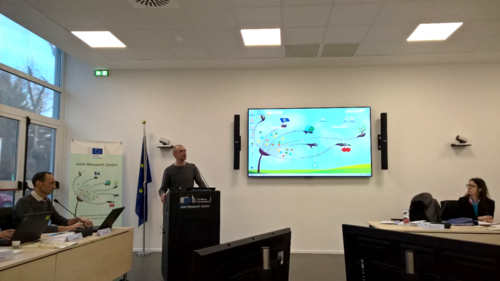
Picture: Joachim Maes is opening the Workshop.
The Workshop aimed at increasing the capacity of enlargement countries to meet their international obligations under the Convention of Biological Diversity and increase the role of the MAES activities as crucial input to the IPBES regional assessments.
More information can be found at the JRC’s website:
https://ec.europa.eu/jrc/en/event/workshop/mapping-and-assessment-ecosystem-services-enlargement-contries
The Routledge Handbook of Ecosystem Services, edited by Marion Potschin, Roy Haines-Young, Rob Fish and Kerry Turner is now published. The volume includes input from people in ESMERALDA who contributed chapters on Indicators for Ecosystem Services, Mapping Ecosystem Services, and Ecosystem Services in the Mediterranean Basin and several other topics.
This handbook provides a comprehensive reference text on ecosystem services, integrating natural and social science (including economics). The volume aims to demonstrate the importance of biodiversity for people, policy and practice. The handbook also shows how the value of ecosystems to society can be expressed in monetary and non-monetary terms, so that the environment can be better taken into account in decision making.
The book contains over 50 chapters and seven briefing notes, and spans the spectrum of ecosystem issues from concepts, methods through to applications. In his forward Sir Robert Watson, Professor of Environmental Sciences, at the University of East Anglia in the UK wrote:
"This handbook, written by world-class academic and policy experts, is long overdue, and provides a much-needed guide to address this challenge. It is an authoritative reference text written in easy to read sections that is essential reading for academics, decision-makers and civil society."
A discount is available by using the code in the flyer attached, for those who are interested to buy a copy or encourage their library to obtain one.
For more information see: https://www.routledge.com/products/9781138025080
The TUNESinURB project Kick-off meeting took place on 28 January 2016 in Sofia, Bulgaria. TUNESinURB will operate on a national level, aiming to create an information system on urban ecosystems and their ecosystem services for Bulgaria.
The project will use a set of indicators for ecosystem services assessment and mapping to facilitate the understanding and implementation of sectoral policies for planning and development of urban territories.
TUNESinURB is financed by the Financial Mechanism of the European Economic Area (EEA FM) 2009-2014 and is coordinated by the Forest Research Institute, Bulgarian Academy of Sciences in partnership with Sofia University "St. Kliment Ohridski", GEOgraphica Ltd., and the Norwegian Institute of Bioeconomy Research (NIBIO).
ESMERALDA was also presented at the project’s kick-off, by our partner Stoyan Nedkov, National Institute of Geophysics, Geodesy and Geography, Bulgarian Academy of Sciences, to open the possibilities for future collaboration. Options for use of common case studies and application of mapping methods were discussed, as well as the development of national network on ecosystem services in Bulgaria in collaboration with the Ecosystem Services Partnership and MAES activities.
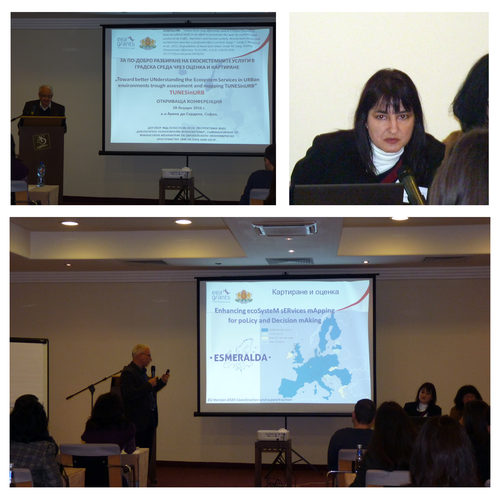
Images from the TUNESinURB Kick-off, clockwise from top to bottom: Opening speech by Prof. H. Tsakov, Director of Forest Research Institute, Bulgarian Academy of Sciences; TUNESinURB project Co-ordinator Dr. M. Zhiyanski; ESMERALDA partner S. Nedkov presenting the project; Credit: Pensoft
The Belgium Ecosystem Services (BEES) network is a community of practice aiming to connect different societal actors involved in ecosystem services research, practice and policy-making. In December 2015, for a second year BEES had organized a X-mas market with the aim to bring together scientists, practitioners and policy makers in an informal setting to stimulate interaction and exchange of ideas.
ESMERALA was also present at the market with a separate stand where the project was showcased, the project was also included in the reporting video. Learn more about the participants and outcomes of the market in the video below:
BEES Christmas Market 2015 from Belgian Biodiversity Platform on Vimeo.
The University of Nottingham is opening a position for Associate Professor in the School of Geography.
The University is seeking to appoint an academic to make a significant leadership impact within the research and teaching area of environmental management (which could include topics such as ecosystem services, sustainability, climate change, development, hazards, risk and human health and well-being). Experience in the application of remote sensing and/or GIS techniques to environmental management issues would be welcome.
Deadline: 22nd February 2016
More information on the position and requirements available here.
A new paper "Combining internal and external motivations in multi-actor governance arrangements for biodiversity and ecosystem services" published in the journal Environmental Science & Policy looks at ways to motivate actions for biodiversity conservation and ecosystem services provision. The paper is a result of the EU FP7 funded project BIOMOT.
Abstract:
This paper analyses the possibility of building a mutually supportive dynamics between internally and externally motivated behaviour for biodiversity conservation and ecosystem services provision. To this purpose a face to face survey amongst 169 key actors of 34 highly successful and prominent biodiversity arrangements in seven EU countries was conducted. The main finding of the paper is the feasibility of combining inherently intrinsically motivated behaviours (providing enjoyment, pleasure from experimentation and learning, aesthetic satisfaction) and internalized extrinsic motivations (related to the identification with the collective goals of conservation policy) through a common set of governance features. Successful initiatives that combine internal and external motivations share the following features: inclusive decision making processes, a broad monitoring by "peers" beyond the core staff of the initiatives, and a context that is supportive for the building of autonomous actor competences. These findings are in line with the psycho-sociological theory of motivation, which shows the importance of a psycho-social context leading to a subjective perception of autonomy and a sense of competence of the actors.
Original Source:
Tom Dedeurwaerdere, Jeroen Admiraal, Almut Beringer, Flavia Bonaiuto, Lavinia Cicero, Paula Fernandez-Wulff, Janneke Hagens, Juha Hiedanpää, Paul Knights, Erica Molinario, Paolo Melindi-Ghidi, Florin Popa, Urban Šilc, Nathalie Soethe, Tiina Soininen, Jose Luis Vivero, Combining internal and external motivations in multi-actor governance arrangements for biodiversity and ecosystem services, Environmental Science & Policy, Volume 58, April 2016, Pages 1-10, ISSN 1462-9011, http://dx.doi.org/10.1016/j.envsci.2015.12.003
ESMERALDA is featured in the Research & Innovation news to expose the project to a great audience across Europe and the World.
"EU-funded project ESMERALDA is developing ways to assess Europe's biodiverse ecosystems and their many contributions to society and the economy." states the story going in deph through the ways in which the project aims to provide methods to asses the state of ecosystems across Europe towards supporting Action 5 of the EC Biodiversity Strategy 2020.
Read more in the original news story.
What do people value, why and how? This should be a leading question in sustainability research, but putting it into practise can be tricky. A new paper published in the journal Ecosystem Services looks at how to improve stakeholder participation in the research on and governance of ecosystem services (ESS) as a stepping point to more comprehensive and participatory research practises.
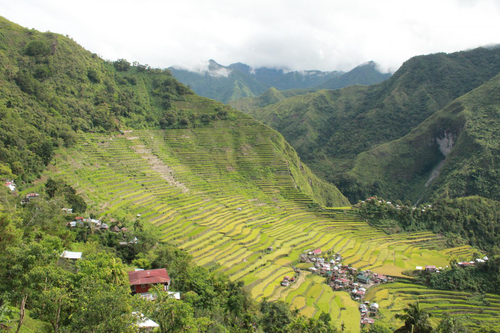
Credit: J. Settele
Stakeholder participation in the governance of ecosystem services (ESS) is conceptually necessary, especially in the light of the failure of monetary valuation to provide assessment instruments suitable as policy guidance. To answer the Whys and Hows of ESS research real involvement and participation of stakeholders has proven to be a more valuable tool.
Building upon experience from transdisciplinary research projects in Asia, Africa and Europe, the new paper argues that successful participation depends on the specific socio-cultural context and requires different means and modes of participation during different project phases.
The paper provides a useful overview of tested methods, with their pros and cons listed. Alongside the challenges on the basis of different projects experiences, the research also outlines the ways in which good project coordination can help for such difficulties to be anticipated and handled. The main conclusions and recommendations are extracted in five core lessons, with regards to:
- Participation;
- Target groups;
- Integration;
- Managing;
- Limits to economic valuation;
This paper benefitted from the experience in transdisciplinary research projects over the last 20 years, in particular the EU FP 6 Integrated Project "ALARM" (GOCE-CT-2003-506675, 2003-2008), "LEGATO" (German Ministry for Education and Research, research Grant no. FKZ01LL0917A-01LL0917O, 2010-2016), "EO-Miners" (EU FP 7 research Grant agreement no. 244242, 2009-2013), "APPEAL" (funded by BiodivERsA 2011-33, Grant 01LC1102A, 2011-2015),"EJOLT" (EU FP7 Science in Society Grant agreement no. 266642, 2011-2015), "ENRI" (ESF European Science Foundation funded, 2011-2015), "DEEDS" (EU Leonardo da Vinci Programme funded, 2005-2008) (Contract no. DK/06/B/F/PP-145612'DK/06/B/F/PP-145612), "SUSTRAT" (EU FP5 funded, IHDP endorsed, 2002-2006) (Contract no. HPSE-CT-2002-50019HPSE-CT-2002-50019), and earlier projects.
Original Source:
Joachim H. Spangenberg, Christoph Görg, Josef Settele, Stakeholder involvement in ESS research and governance: Between conceptual ambition and practical experiences - risks, challenges and tested tools, Ecosystem Services, Volume 16, December 2015, Pages 201-211, ISSN 2212-0416, http://dx.
The first ESMERALDA Stakeholder Workshop took place from 13 to 16 October 2015 in Riga, Latvia, as the first of a series of events planned to enhance the project collaboration with stakeholders. The event brought together project partners and stakeholders to discuss the state and gaps of ecosystem service mapping and assessment activities in their countries, and the ways ESMERALDA outputs can feed into their work to achieve Action 5 of the EU Biodiversity Strategy.
The following video reports back from the workshop:
Just 10 days before Christmas EMSERALDA participated at the BEES Christmas Market, which took place on 15 Dec 2015 in Brussels, Belgium. The event brought together experts, NGOs and organizations working in the sphere of ecosystem services to discuss and present their work.
ESMERALDA had its own stand where we had the opportunity to showcase our aims and objectives and discuss future work.
We want to wish you a Merry Christmas and a Happy New Year with this picture from the event and wish the project another year of fruitful work!
